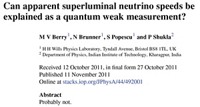Advertisement
Grab your lab coat. Let's get started
Welcome!
Welcome!
Create an account below to get 6 C&EN articles per month, receive newsletters and more - all free.
It seems this is your first time logging in online. Please enter the following information to continue.
As an ACS member you automatically get access to this site. All we need is few more details to create your reading experience.
Not you? Sign in with a different account.
Not you? Sign in with a different account.
ERROR 1
ERROR 1
ERROR 2
ERROR 2
ERROR 2
ERROR 2
ERROR 2
Password and Confirm password must match.
If you have an ACS member number, please enter it here so we can link this account to your membership. (optional)
ERROR 2
ACS values your privacy. By submitting your information, you are gaining access to C&EN and subscribing to our weekly newsletter. We use the information you provide to make your reading experience better, and we will never sell your data to third party members.
The article "Journals Grapple with Ethics Issues" (C&EN, April 10, page 62), prompted me to write about my own personal experience with some of the issues raised. This incident involved a paper published by Chinese researchers this year and a previous paper I had written a few years ago for another journal. Since I am still active in this area of research, I eagerly began reading the former paper only to find parts of the introduction hauntingly familiar. Cross-checking my publication I realized that nearly an entire paragraph of the introduction had been reprinted, virtually word for word. I contacted the editor of the journal, who handled the matter by requesting that the authors publish an erratum and send a letter of apology. The C&EN story says, "When it comes to copying boilerplate-type text for an article, 'for many Chinese authors, it's nonoffensive,'" says Richard Eisenberg, editor-in-chief of Inorganic Chemistry. Of course such copying is offensive to Western norms, yet one cannot help but wonder if the wayward authors are equally offended for being asked to apologize for something that is perfectly acceptable to them.
George W. Wagner
Elkton, Md.
Anyone looking for the reason why scientific fraud and ethics violations in journals have seemed to increase rapidly in recent decades would do well to follow the lead of detectives looking to solve crimes: "Follow the money."
In the 1950s when I got my doctorate degree, though there was great competition to publish first (sometimes by submissions on the identical research only a few days apart), the goal was academic pride and maybe a race ultimately for a grand international prize. Over time, academic research has become more the search for the gold mine rather than the gold medal. Science has degenerated so much that a recent ad by a university in the March 27 C&EN for organic chemistry postdocs referred to "several start-up companies planned and opportunities at the ground floor anticipated."
With so much money at stake, is it any wonder that science has become infected with the present ills of big business, with profit above all, and with no consideration given to how it is obtained or the results of the chase on others? This is based on my experience working in corporations and encountering those few for whom ethics was not a word they could define. We are now beginning to see the twisting of science, not by corporations as in the past, but by the practitioners of science themselves.
Ellis Glazier
La Paz, Mexico
CORRECTIONS
May 22, page 34. The instrument pictured should have been identified as a Dionex high-performance liquid chromatography (HPLC) system, not a gas chromatograph and mass spectrometer.
May 29, page 11. Dow Chemical's R&D spending for 2005 was $1.1 billion.



Join the conversation
Contact the reporter
Submit a Letter to the Editor for publication
Engage with us on Twitter